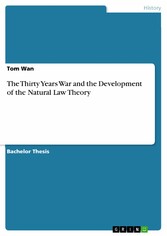Search and Find
Service
The Thirty Years War and the Development of the Natural Law Theory
Bachelor Thesis from the year 2011 in the subject History of Europe - Middle Ages, Early Modern Age, grade: Merit, University of Hull, course: History, language: English, abstract: The Thirty Years War embodied the impact of Protestantism to the peculiar route of state development of the Empire and subsequently the peculiarity of the development of political theories from the example of the Empire. The War was the last of a violent wave of political reforms which rode on the tide of ecclesiastical reformation: a tide which ravaged Europe since Martin Luther. The German Reformation was both an ideological and political movement that pitted the Protestant against the Catholics including the Emperor. It was pacified in mid 16th century but restarted and escalated during the Thirty Years War. Like the conflict of the 1540's in the Empire and late 16th century Europe, the War was partly a political struggle between territorialism and central power - in this case between the Protestant princes and the Holy Roman Emperor. Parallel to the center-peripheral struggle, as both the provincial Protestants and the Emperor's adherents were equipped with exclusive moral philosophies, it cleaved two irreconcilable and mutually suspicious factions within the Constitution. Thus the end of the war there breeds a secular political innovation, a middle way comprises of both Protestants and Catholics without ecclesiastical conflicts that need to be resolved outside of the legal institution, under a Catholic theocracy which was a fundamentally exclusive federation before 1648. The peculiarity of the Thirty Years War to continental Europe was that, its outcome the Peace of Westphalia, unlike the other religious edicts, has not only shattered the ambiguity of a medieval feudal-theocratic structure that was the Imperial Constitution; it has also rejuvenated the Holy Roman Empire's unity from within its peculiar medieval structure. The old feudal representative structure embedded in the Constitution was furthered and therefore spared the Empire's need to eliminate, but to include the Protestant opposition in a German federation. This development inspired legal political theorists such as Samuel Pufendorf and statesmen to envision rational, defined states based on the hitherto model of the Empire, a quasi-secular legal system. Thus, the implication of the Peace was both political and philosophical: first it reformed and consolidated Imperial structure; secondly it implied a separate model distinguished from the rest Western Europe for contemporary political philosophers concerning with how the state should behave morally.
As the Research Director in European Politics at the Global Studies Institute in Hong Kong, an institution set up by renowned international relations scholar Simon Shen, I am one of the youngest and most avid multi-platform commentator in European affairs in Hong Kong. With a degree in history, and a master's of science degree in EU politics specialized in the governance of the European Union from the prestigious London School of Economics and Political Science, I have written dozens of commentaries on several publications in the Greater China region, as well as guest to numerous TV and radio broadcastings in Hong Kong. A majority of my articles can be seen in the Hong Kong Economic Journal, while I've also written articles for UDN Global (???), the Taipei-based newspaper, and the Guangzhou-based Nanfeng Chuang Journal (???). In light of the recent Brexit incident, I've been quoted in the Hong Kong Economic Journal, published extensively on online platforms such as the Initium and Insight Post, while making several broadcastings produced by the RTHK and TVB, including a lengthy interview featured in "On the Record" (http://mytv.tvb.com/tc/cat_news/ontherecord/257528) as well as Pentaprism II ?http://programme.rthk.hk/rthk/tv/programme.php?name=tv/pentaprismII&d=2016-06-24&p=4101&e=362234&m=episode). My stance on the referendum has been a simple one; there's simply no factual ground to support that in even the most optimist scenario that Great Britain can gain advantage over its former self. I predicted that not only the referendum would have alienate further of Britain's allies on the continent, it would also further the conflict between the devolved entities (for example Scotland and Northern Ireland) with Westminster and the majority of England. Tragically, almost all of my prediction held true as Nicola Sturgeon seemed poised to host another referendum and that the confidence in the UK economy has already felt the shock of Brexit, seen in the Gilt yields' wild rise after the referendum. For the British people it is a time to rebuild and rethink what needs to be done to reach an amicable break from the European Union, and for us as oversea observers we should aim to seize upon this historic moment to enhance our knowledge of the working of the EU and create opportunities out of it.
All prices incl. VAT













